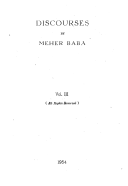Source: Discourses (1967), Vol. III, Ch. 1 : The Avatar, p. 11.
Context: CONSCIOUSLY or unconsciously, every living creature seeks one thing. In the lower forms of life and in less advanced human beings, the quest is unconscious; in advanced human beings, it is conscious. The object of the quest is called by many names — happiness, peace, freedom, truth, love, perfection, Self-realisation, God-realisation, union with God. Essentially, it is a search for all of these, but in a special way. Everyone has moments of happiness, glimpses of truth, fleeting experiences of union with God; what they want is to make them permanent. They want to establish an abiding reality in the midst of constant change.
It is a natural desire, based fundamentally on a memory, dim or clear as the individual’s evolution may be low or high, of his essential unity with God; for, every living thing is a partial manifestation of God, conditioned only by its lack of knowledge of its own true nature. The whole of evolution, in fact, is an evolution from unconscious divinity to conscious divinity, in which God Himself, essentially eternal and unchangeable, assumes an infinite variety of forms, enjoys an infinite variety of experiences and transcends an infinite variety of self-imposed limitations. Evolution from the standpoint of the Creator is a divine sport, in which the Unconditioned tests the infinitude of His absolute knowledge, power and bliss in the midst of all conditions. But evolution from the standpoint of the creature, with his limited knowledge, limited power, limited capacity for enjoying bliss, is an epic of alternating rest and struggle, joy and sorrow, love and hate, until, in the perfected man, God balances the pairs of opposites and transcends duality. Then creature and Creator recognise themselves as one; changelessness is established in the midst of change, eternity is experienced in the midst of time. God knows Himself as God, unchangeable in essence, infinite in manifestation, ever experiencing the supreme bliss of Self-realisation in continually fresh awareness of Himself by Himself.
This realisation must and does take place only in the midst of life, for it is only in the midst of life that limitation can be experienced and transcended, and that subsequent freedom from limitation can be enjoyed.

